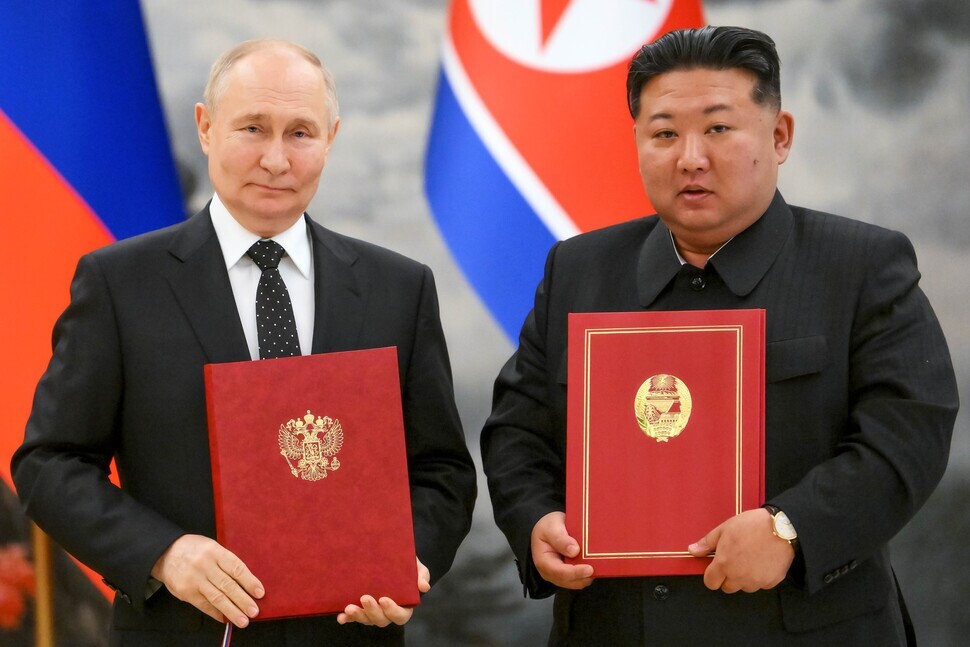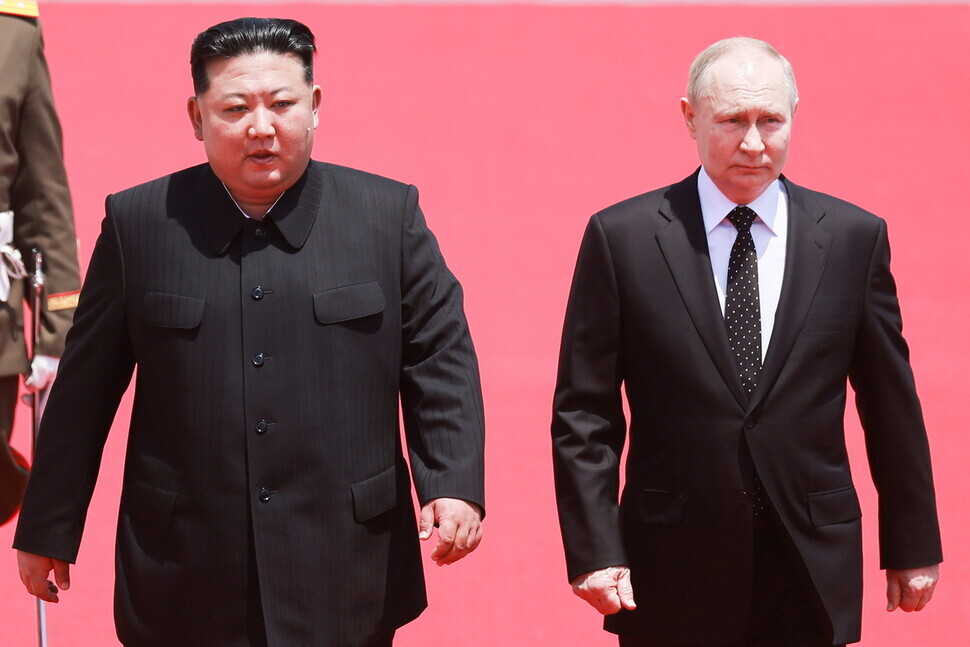hankyoreh
Links to other country sites 다른 나라 사이트 링크
Partners, allies or something else? How North Korea and Russia are framing new pact

In a bilateral summit Wednesday afternoon at the Kumsusan State Guesthouse in Pyongyang, North Korean leader Kim Jong-un and Russian President Vladimir Putin pledged to build a long-term relationship between Pyongyang and Moscow, aiming to achieve a “new multipolar world” by means of a coalition against the US.
This was the content of the comprehensive strategic partnership agreement through which the two sides re-established their relationship during Putin’s first North Korea visit in 24 years.
It remains too early to tell for certain what the new North Korea-Russia relationship decided by Kim and Putin will mean in practical terms. The full text of the agreement — which is poised to serve as a new legal foundation document for their relationship — was not immediately made public.
At a joint press announcement after Putin’s nearly four-hour meeting with Kim, it was declared that the agreement included terms for “mutual assistance” if either side suffers “aggression.” This suggests that the closeness between the two sides has been further intensified.
Putin stated that the expansion of military exercises by South Korea, the US and Japan “undermine[s] peace and stability,” while Kim said the new agreement was of a “peace-loving and defensive nature.”
The key question concerns the specific conditions and nature of the “mutual assistance.”
Like the new agreement, the previous Treaty of Friendship, Good-Neighborliness, and Cooperation signed by the two sides on Feb. 19, 2000 — which went to serve as the legal foundation document for their relationship — has never been made public.
Article 2 of a joint declaration adopted by the two sides during Putin’s first North Korea visit on July 19, 2000, was known to have included a pledge for them to “get in touch with each other without delay” when “there is the need to have consultations and cooperate.”

In contrast, the USSR-North Korea Treaty of Friendship, Cooperation and Mutual Assistance signed during the Cold War on July 6, 1961, including automatic military intervention terms in its Article 1, stating the obligation for each to “immediately extend military and other assistance with all the means at its disposal” if the other side suffers or is threatened with armed attack.
During the joint press announcement, Kim emphasized that the two sides’ relationship had “risen to a new high level of alliance.”
“Today, the anchor has been raised at this spot and the solemn start of allied relations between the DPRK and the Russian Federation has been announced,” he added. From these remarks, the new agreement would appear to be closer in its orientation to the 1961 “alliance” treaty than the 2000 treaty.
At the same time, it should not be overlooked that unlike Kim, Putin did not use the word “alliance” even once during the announcement.
This may be taken as showing a difference in perceptions between North Korea, which hopes to vaunt its closeness with Russia both domestically and abroad, and Russia, which hopes to manage its relationships with other Northeast Asian countries, including South Korea and China.
The question is whether the terms of “mutual assistance” include a legally binding commitment to automatic intervention. The nature of assistance differs dramatically depending on whether such a commitment is present or not.
As an example, the alliance treaty between South Korea and the US includes no obligation of automatic intervention in service collective defense, whereas the treaty between North Korea and China does.
Article 3 of the South Korea-US Mutual Defense Treaty leaves out a commitment to automatic intervention, stating that each party “would act to meet [a] common danger in accordance with its constitutional processes.” The reference to “constitutional processes” means that the US military would require congressional approval to engage in acts of war in support of South Korea.
In contrast, the Sino-North Korean Treaty of Friendship, Cooperation, and Mutual Assistance signed on July 11, 1961, stipulates an automatic intervention obligation, stating that each party will “immediately render military and other assistance by all means at its disposal.”
A former key administration figure with years of experience working at the National Intelligence Service and Blue House said, “Based solely on what has been reported in the foreign press, the nature of the new North Korea-Russia agreement appears to be closer to the 2000 treaty than the 1961 ‘alliance’ treaty, but we would have to see the full text to know for sure.”
Doo Jin-ho, the director of the global strategy division at the Korea Institute for Defense Analyses, stressed, “‘Mutual assistance’ does not necessarily mean terms for automatic intervention.”
“We should note the fact that while Kim Jong-un emphasized a ‘powerful alliance’ numerous times, Putin never used the word ‘alliance’ once,” he added.
If the new North Korea-Russia agreement does stipulate automatic intervention terms, that would have a potentially seismic effect on the trilateral relationships established by South and North Korea and Russia over more than three decades since the South formed diplomatic ties with the Soviet Union on Sept. 30, 1990.
By Lee Je-hun, senior staff writer; Park Min-hee, senior staff writer
Please direct questions or comments to [english@hani.co.kr]

Editorial・opinion
![[Editorial] Silence won’t save Yoon [Editorial] Silence won’t save Yoon](https://flexible.img.hani.co.kr/flexible/normal/500/300/imgdb/original/2024/0701/681719819632087.jpg) [Editorial] Silence won’t save Yoon
[Editorial] Silence won’t save Yoon![[Column] The miscalculations that started the Korean War mustn’t be repeated [Column] The miscalculations that started the Korean War mustn’t be repeated](https://flexible.img.hani.co.kr/flexible/normal/500/300/imgdb/original/2024/0630/9717197068967684.jpg) [Column] The miscalculations that started the Korean War mustn’t be repeated
[Column] The miscalculations that started the Korean War mustn’t be repeated- [Correspondent’s column] China-Europe relations tested once more by EV war
- [Correspondent’s column] Who really created the new ‘axis of evil’?
- [Editorial] Exploiting foreign domestic workers won’t solve Korea’s birth rate problem
- [Column] Kim and Putin’s new world order
- [Editorial] Workplace hazards can be prevented — why weren’t they this time?
- [Editorial] Seoul failed to use diplomacy with Moscow — now it’s resorting to threats
- [Column] Balloons, drones, wiretapping… Yongsan’s got it all!
- [Editorial] It’s time for us all to rethink our approach to North Korea
Most viewed articles
- 1Japan is building a military meant for more than self-defense — and has the US to thank for it
- 2[Column] The miscalculations that started the Korean War mustn’t be repeated
- 3[Editorial] Silence won’t save Yoon
- 4Yoon’s prosecutors are throwing everything at the president’s opponents to see what’ll stick
- 5Dreams of a better life brought them to Korea — then a tragic fire tore them apart
- 6Kim Jong-un says N. Korean nukes aren’t just for deterrence
- 7The greatest Korean film of all time, as selected by local industry experts
- 8South Korea creates more US jobs via direct investment than any other county
- 9NewJeans rocks Tokyo Dome as new, younger generation of K-pop fans emerges in Japan
- 10Gangnam’s sex industry